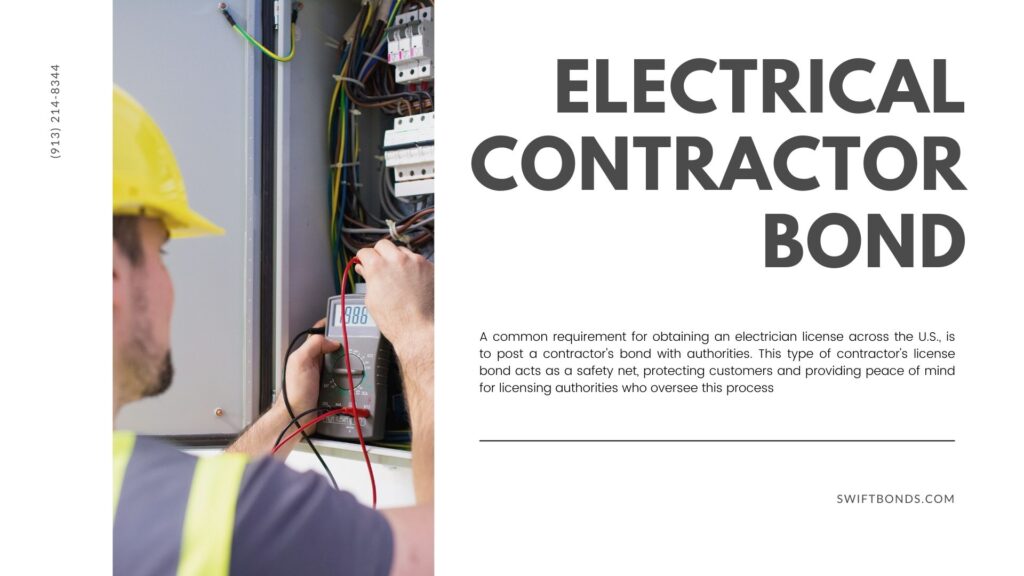
Get An Instant Quote on Opelika, AL-Electrical Contractor Bond ($5,000) Now

Introduction
In Opelika, AL, where innovation meets tradition, electrical contractors play a vital role in powering the community's homes, businesses, and infrastructure. To ensure quality workmanship and adherence to regulatory standards, electrical contractors are required to obtain an Electrical Contractor Bond. This bond serves as a guarantee of compliance with licensing requirements and provides financial protection for clients and regulatory authorities. In this article, we delve into the intricacies of the Opelika, AL – Electrical Contractor Bond ($5,000), shedding light on its purpose, requirements, and implications for contractors and consumers.

Understanding the Purpose
The Opelika, AL – Electrical Contractor Bond serves a critical purpose in safeguarding the interests of consumers, regulatory authorities, and the electrical contracting industry as a whole. By requiring contractors to obtain this bond, Opelika aims to ensure that electrical work is performed safely, competently, and in accordance with established standards. Additionally, the bond provides recourse for consumers and regulatory agencies in the event of faulty workmanship, code violations, or disputes, ensuring that affected parties have avenues for recourse and compensation.
Requirements and Application Process
Obtaining a Opelika, AL – Electrical Contractor Bond involves meeting specific criteria set forth by city authorities. Contractors typically undergo a thorough application process, which may include demonstrating expertise in electrical contracting, providing proof of insurance coverage, and securing the bond from a licensed surety company. The bond amount is set at $5,000, ensuring adequate financial coverage for potential liabilities arising from electrical contracting activities.
Implications for Contractors and Consumers
For contractors, the Opelika, AL – Electrical Contractor Bond carries significant implications for their professionalism, accountability, and legal obligations. It serves as a testament to their commitment to safety, quality, and regulatory compliance in their electrical contracting work. Failure to maintain compliance with the bond requirements can result in fines, penalties, and potential loss of licensure, impacting their reputation and livelihood within the industry. Conversely, for consumers, the bond provides assurance that licensed electrical contractors are held to high standards of competence and reliability, offering protection against substandard workmanship or safety hazards.
Conclusion
As Opelika continues to grow and evolve, the Electrical Contractor Bond remains a cornerstone of consumer protection and industry regulation within the city. By understanding its purpose, meeting the requisite requirements, and embracing its implications, both contractors and consumers can contribute to a safer, more reliable electrical contracting industry that serves the needs of the community effectively and ethically.
What is the Opelika, AL – Electrical Contractor Bond?
The Opelika, AL – Electrical Contractor Bond is a fundamental component of the city's licensing regulations governing electrical contractors. But what does this bond entail? Simply put, it is a form of surety bond required by Opelika to ensure that electrical contractors adhere to all applicable laws, codes, and safety standards while performing electrical work. By obtaining this bond, contractors provide financial security to cover potential liabilities or damages resulting from non-compliance or negligence in their electrical contracting activities.
Frequently Asked Questions
Can the Electrical Contractor Bond Cover Damages Caused by Power Outages or Electrical Failures?
A less common question that may arise regarding the Opelika, AL – Electrical Contractor Bond concerns its coverage for damages caused by power outages or electrical failures. Property owners or consumers may wonder whether the bond extends to cover losses or damages resulting from disruptions in electrical service, such as power outages or equipment failures. The answer to this question depends on the specific terms outlined in the bond agreement and the regulations set forth by the city. While the bond typically provides coverage for liabilities arising from contractor negligence or non-compliance, it may not extend to cover damages caused by external factors beyond the contractor's control, such as natural disasters or utility infrastructure failures. Property owners should consult with their insurance provider or legal counsel to determine coverage options for damages caused by power outages or electrical failures.
Are There Provisions for Bond Claims If Electrical Work Leads to Interference with Telecommunication or Data Transmission Systems?
Another uncommon inquiry concerns the provisions for bond claims if electrical work leads to interference with telecommunication or data transmission systems in Opelika. Property owners or telecommunications providers may wonder whether they can file a claim against the bond if electrical installations or repairs cause disruptions or damages to telecommunication infrastructure, such as telephone lines, internet cables, or wireless networks. Additionally, they may inquire about the process for documenting interference, filing bond claims, and coordinating with relevant authorities for remediation or compensation. The applicability of bond claims for interference with telecommunication systems often depends on the specific terms outlined in the bond agreement and the regulations set by the city. Telecommunications providers should consult with legal counsel or regulatory authorities to understand the procedures for filing bond claims related to interference with telecommunication or data transmission systems.
Can Contractors Obtain Waivers or Reductions of Bond Requirements for Low-Risk or Non-Electrical Projects?
A lesser-known aspect that contractors may inquire about is the possibility of obtaining waivers or reductions of bond requirements for low-risk or non-electrical projects in Opelika. Contractors involved in projects such as lighting fixture installations, minor repairs, or low-voltage wiring may wonder whether they can request exemptions from the bond requirement or seek reductions in bond amounts for activities that do not pose significant electrical hazards or liabilities. The availability of waivers or reductions often depends on the discretion of city officials overseeing regulatory compliance. Contractors should consult with regulatory authorities or licensing agencies to inquire about the possibility of obtaining waivers or reductions of bond requirements for low-risk or non-electrical projects and understand the procedures for requesting such exemptions.
